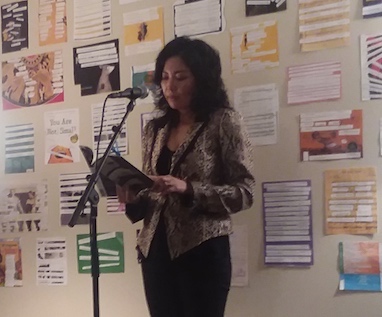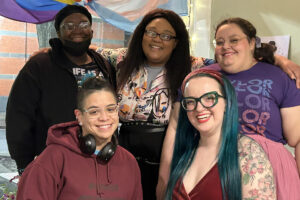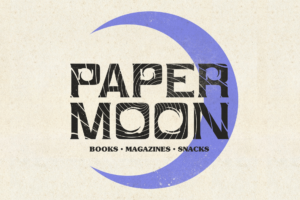A small stage was set up against the interior wall of the Carol Ann Donahue Collection (Poetry) room at the Shea Learning Center in Troy. The lights were dimmed, and the twenty seats and an alcove made a comfortable space for the poetry lovers who gathered. Matthew Klane, faculty advisor for The Rev, Sage College’s literary magazine, introduced Wendy Chin-Tanner, citing her many achievements as: a founding editor at Kin Poetry Journal, poetry editor at The Nervous Breakdown, and co-founder of A Wave Blue World, an independent publishing company for graphic novels. After a round of applause, she stood and crossed the maroon carpet, taking the spotlight.
She opened with her first book, Turn,a poetry collection colored by the lens of her prior profession as an academic in sociology and cultural studies. Chin-Tanner opened with an explanation of the structure of the collection: “A memoir in verse, that’s written in three parts. Those parts correspond to stages in life; they also correspond to the three stages of revolution…I actually find that to be a very moving idea, as when to apply it to the way that we grow as human beings, you know, we begin in a certain place, we react against it and hopefully we come to some resolution or synthesis.” She proceeded to read through the opening poems of the three separate sections, “Thesis,” “Antithesis,” and “Synthesis,” as well as selected poems that framed the scope of the book, the journey of childhood, adolescence, and adulthood, how the influence of her birth family shapes the same journey, and her experience of starting her own family.
She then flipped to the pages that she carried with her, printed selections from her forthcoming book, Anyone Will Tell You. She paused to explain the book’s format, as it differs from the previous: “The vast majority of them [the poems] are in a form that I made up, I call by three by threes or tri-syllabic triplets… That basically means that there are three syllables per line and three lines per stanza… It was developed after the birth of my second daughter, I would spend hours doing this bounce-walking thing. It was the kinetics of the walking…all the hormones…that insane cocktail…plus all I had was my iPhone, this tiny screen…” She chose the eponymous poem to begin, followed by “The Mother in this Poem is Me or You or Your Mother,” “On Truth in a Nonmoral Sense.”, and “Velleity.” Similar in scope to Turn, this collection post-iPhone composition had a percussive, sharpened quality granted by the format that she created.
During the following Q&A a comment rolled into a question, “How can styles of poetry be so different but topics so similar?” Chin-Tanner replied, “I experience composition less in terms of image and more in terms of the music of the language, so I think that it informs the work in that very elemental sense.” When asked about the writing and publishing process, she turned to the advice of her mentor, who posited, “Are you writing a letter to yourself or a letter to the universe?” She continued on his behalf, “If you are writing a letter to yourself, it can stay in your diary. If you’re writing a letter to the universe, then that’s a poem.”





